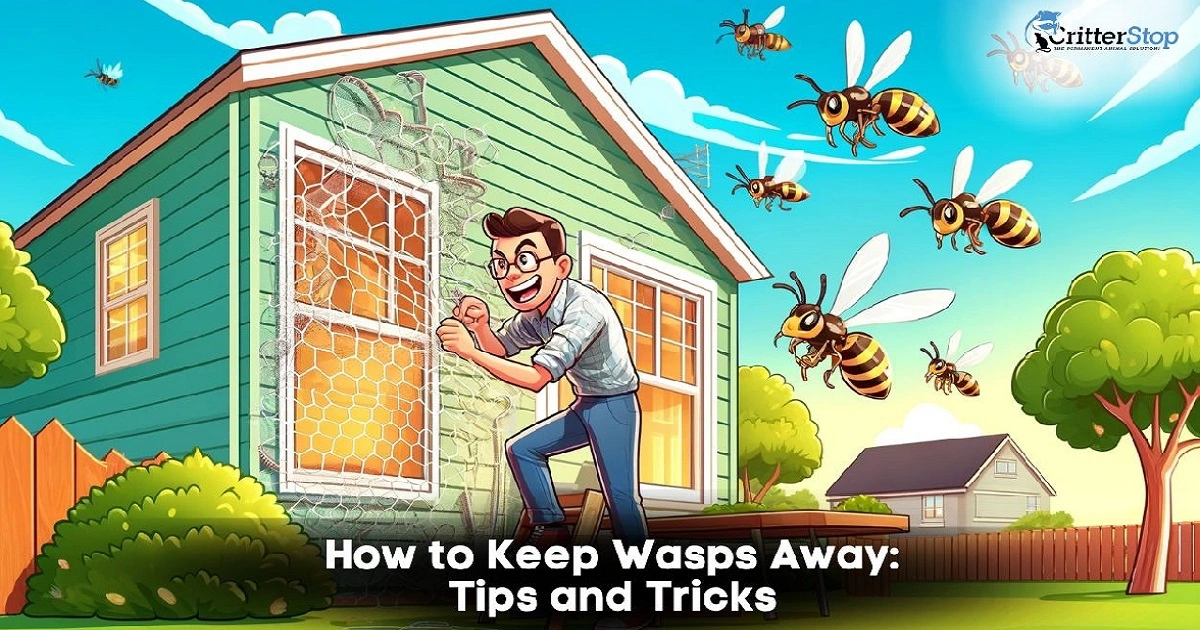
Wasps are a nuisance, especially when they invade outdoor spaces. Their stings can be painful, and they can also damage your property. However, there are ways to keep wasps away without resorting to harmful chemicals or traps.
Introducing effective wasp repellent methods, such as inflatable paper bags, dryer sheets, commercial wasp spray, DIY wasp traps, natural pest-repellent oils, sealing cracks to prevent entry, and using wasp powder made from diatomaceous earth, can further enhance your efforts in maintaining a wasp-free environment.
One effective method to keep wasps away is to remove their food sources. Wasps are attracted to sugary foods, so it’s important to keep these items covered and sealed. Additionally, keep your outdoor trash cans tightly closed to prevent wasps from scavenging for food.
Another way to deter wasps is to plant certain types of herbs and plants in your garden. Wasps are repelled by strong scents such as mint, basil, and lemongrass. By planting these herbs and other plants, such as marigolds and geraniums, you can create a natural barrier to keep wasps away from outdoor spaces.
Wasps are flying insects in the Hymenoptera order. They have slender bodies, very narrow waists, and powerful stingers. Wasps can benefit the environment by preying on other insects and helping pollinate plants.
However, they can also be a nuisance and threaten humans, especially people who are allergic to their venom. Understanding where wasps build nests can be crucial in devising strategies to keep them away, as certain repelling methods can be targeted at these preferred nesting areas.
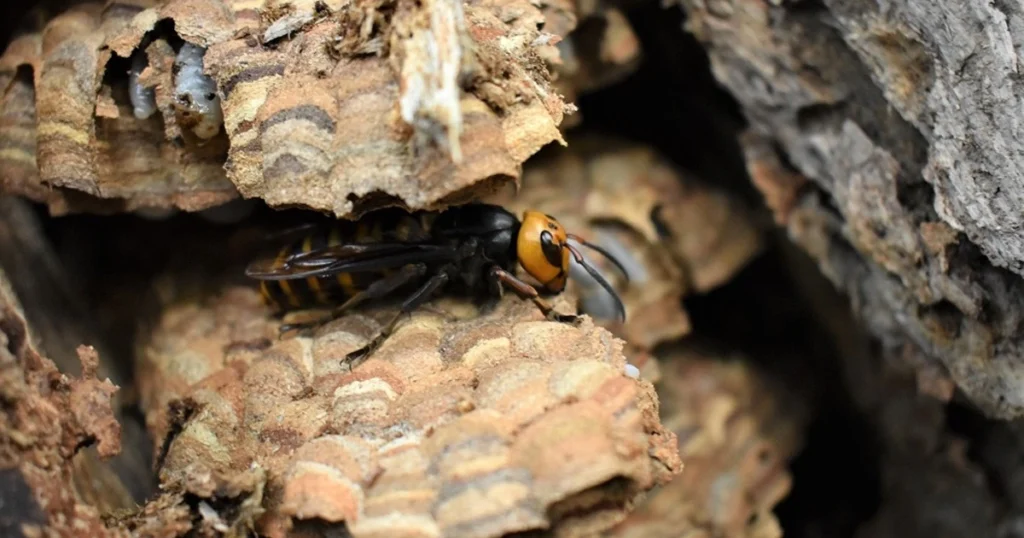
There are multiple types of wasps, but the most common are paper wasps, yellow jackets, and hornets. Paper wasps are known for their unusual papery nests, built by chewing wood fibers and mixing them with saliva.
Yellow jackets are aggressive wasps attracted to sweet foods. They can be found in large numbers around trash cans and outdoor dining areas. Hornets are the largest wasps and are known for their painful stings.
Other types of wasps include mason wasps, which are beneficial as they prey on spiders and other insects, and wood wasps, which can be destructive as they lay their eggs in wood, causing damage to buildings and structures.
Paper wasps tend to build new nests in the same locations, according to information from Clemson University Cooperative Extension Service, highlighting the importance of monitoring these areas for nest prevention.
Wasps are social insects living in colonies. The queen wasp is responsible for laying eggs, while the worker wasps are responsible for building nests, gathering food, and caring for the young. Wasps are active during the day and always hunt for something sweet to chew on.
When threatened, wasps defend themselves by stinging. Their stingers can be painful and cause an allergic reaction in some people. To prevent them from being aggressive, it’s important to avoid swatting or disturbing their nests.
To prevent wasps from becoming an issue, we must understand their behavior and take steps to keep them away from your property and living areas.
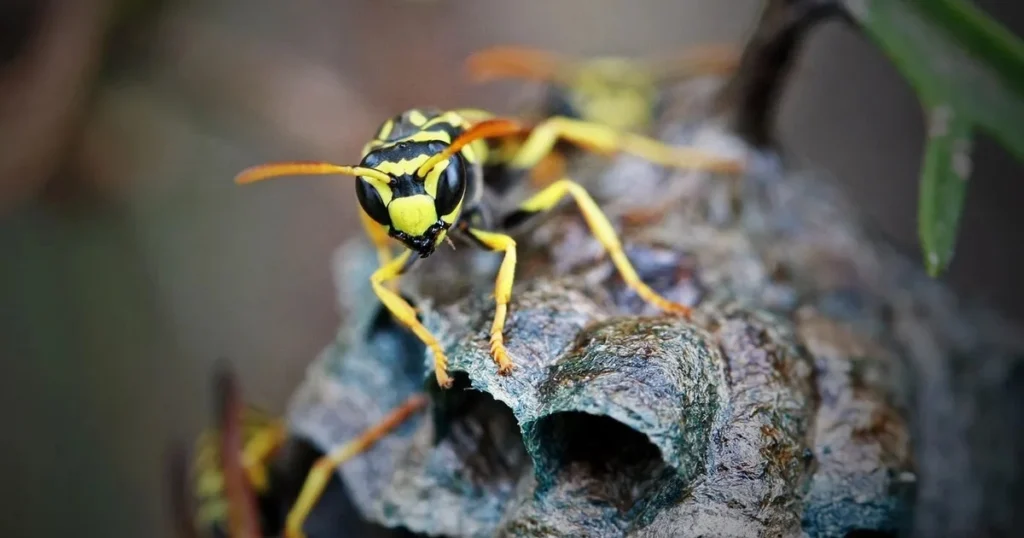
Wasps can be a nuisance, especially during the summer when they are most active. To keep wasps away, it's important to take preventive measures. The following tips can help in keeping wasps away from your home and garden:
Maintaining clean spaces is crucial in keeping wasps away. Wasps like sweet things, so it’s important to keep food and drinks covered and stored away. Spills or crumbs should be cleaned up as fast as possible to avoid attracting wasps. Garbage cans should also be tightly sealed and emptied regularly, as they can also attract wasps.
Securing food sources is another important step in keeping wasps away. When eating outdoors, it's best to use covered containers and keep food and drinks away from the edges of tables. Wasps can easily crawl into open cans and bottles, so it's important to use straws or drink from covered cups. Additionally, it's important to keep all food stored in airtight containers to prevent wasps from getting inside.
By following these preventive measures, homeowners can effectively keep wasps away from their homes and gardens. It's important to note that if a wasp nest is present on the property, it should be removed by a professional pest control service to avoid the risk of stings.
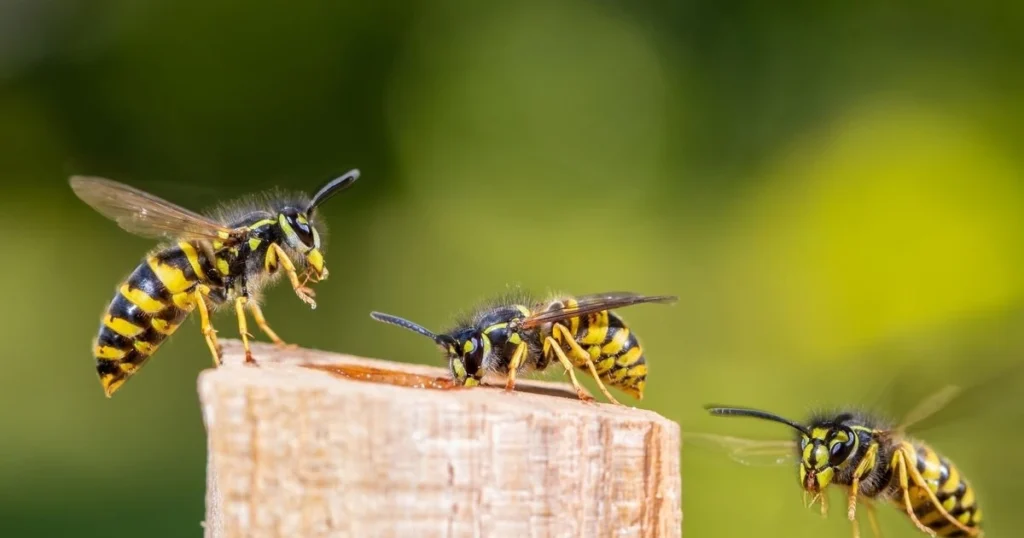
Wasps can be a nuisance and sometimes even dangerous, especially if someone in your household has an allergy to their stings. While there are many commercial products available to keep wasps away, some people prefer to use natural repellents, including wasp repellent plants like lemongrass, peppermint, thyme, eucalyptus, wormwood, bay leaves, citronella, cloves, marigolds, geraniums, and pennyroyals. These plants can effectively keep wasps away when planted near your property, windows, and doors. Here are a few options:
Many essential oils have natural insect-repelling properties, and some are particularly effective against wasps. Peppermint oil, for example, is known to deter wasps and can be used in different ways.
One option is to mix a few drops of peppermint oil in a spray bottle and use it around areas where wasps tend to gather. Another option is soaking cotton balls with peppermint oil and place them in areas where wasps are likely to enter, such as doors and windows.
Other essential oils that may help keep wasps away include clove, lemongrass, and eucalyptus. However, essential oils must be used cautiously, as they are very toxic when ingested or touching your skin.
Certain plants have natural insect-repelling properties and can effectively keep wasps away. One option is to plant mint, which not only smells good but also deters wasps. Other options include citronella, lemongrass, and wormwood.
Another option is to place potted plants near doors and windows, as wasps are less likely to enter areas that are surrounded by plants. Some plants that may be effective at deterring wasps include marigolds, geraniums, and basil.
While these natural repellents may not be as potent as commercial products, they can be a safe and effective way to keep wasps away. However, if you have a severe wasp infestation, the best you can do is to call a professional pest control service.
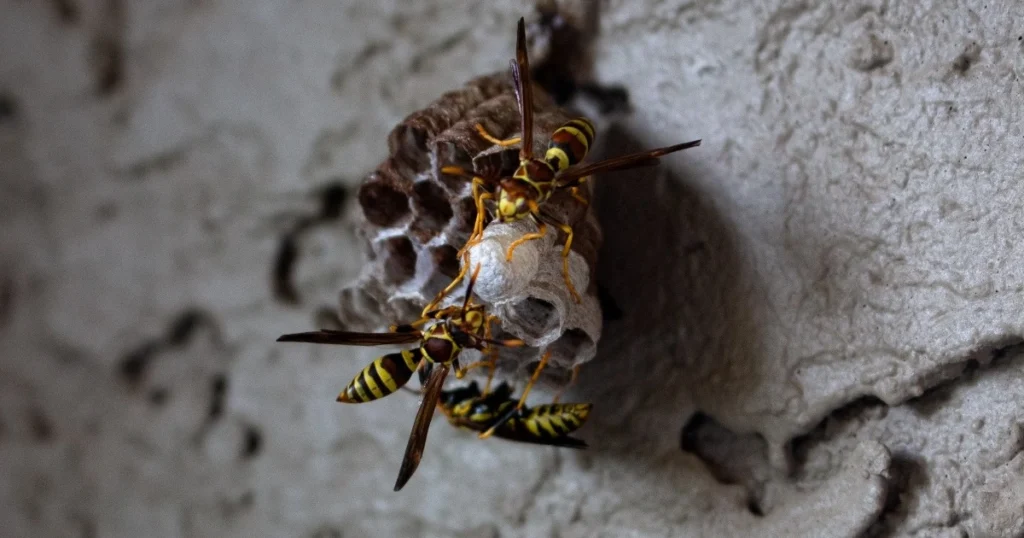
To keep wasps away, it's important to create physical barriers that prevent them from entering your house or invading outdoor living spaces. Physical barriers are effective because they provide a physical obstacle that prevents wasps from entering the area.
One effective way to keep wasps away is to use wasp nets. These nets are made from fine mesh material designed to keep wasps out. You can find them in multiple sizes and use them to cover windows, doors, and other entry points. Wasp nets are easy to install and effective ways to keep wasps away from your home.
Another effective method for keeping wasps away is to seal entry points. Like most insects, wasps are attracted to spaces that provide easy access to their nests. By sealing entry points, you can prevent wasps from getting into your home or outdoor living spaces.
Seal all cracks and gaps on windows, doors, and similar entry points using caulk or weatherstripping. This will prevent wasps from entering your home and nesting in the walls or attic.
Insecticides can be used to keep wasps away from your property. These chemicals work by killing the wasps on contact or by repelling them. If you plan to use insecticides, remember to follow the instructions carefully so the product is used safely and effectively.
One effective insecticide is permethrin, which can be found in products such as Raid Wasp & Hornet Killer. This insecticide targets the nervous system of the wasps, causing paralysis and death.
Another option is cypermethrin, which can be found in products such as Spectracide Wasp & Hornet Killer. This insecticide disrupts the nervous system of the wasps, causing paralysis and death.
Wasp sprays are another chemical solution for keeping wasps away from your property. These sprays work by releasing a mist of insecticide that can reach up to 20 feet away, allowing you to take on a few wasps from a safe distance.
One effective wasp spray is Ortho Home Defense Hornet & Wasp Killer. This spray kills wasps on contact and can be used indoors or outdoors.
Another option is the Terro Wasp & Hornet Killer, which also works by killing the wasps on contact and has a foaming action that helps to cover the nest, ensuring all wasps are killed.
It's important to note that these chemicals can effectively keep wasps away, but they should be used cautiously and only as a last resort. It's always best to try non-chemical methods first, such as removing attractants and sealing up entry points.
Wasp traps are an effective way to keep wasps as far away from your home and outdoor areas. There are two types of wasp traps: homemade traps and commercial traps. Wasp traps work by luring wasps with a sweet liquid bait into the trap, where they are unable to escape and eventually drown.
Homemade wasp traps are an affordable and easy way to keep wasps away. They are made with common household items. One popular method is to cut the top off a bottle and invert the bottom half. Then, you can fill the bottom half with a mixture of sugar water and dish soap. The wasps are attracted to the smell of sugary water just to drown in the soapy water.
Another homemade trap involves using a paper bag. Simply crumple up a brown paper bag and hang it near the area where wasps are present. The wasps will mistake the bag for a wasp nest and avoid the area.
Commercial wasp traps are available for purchase at most hardware stores and online. These traps are designed to attract these insects and trap them inside. They typically use a sweet-smelling bait to lure the wasps in.
When using commercial traps, it's important to place them as far away as possible from areas where people hang out. The traps should also be checked regularly and emptied as needed.
If the DIY methods do not work, it's time to call in the professionals. Professional wasp control services like Critter Stop have the necessary expertise and gear to manage wasp infestations effectively.
One advantage of hiring a professional wasp control service is that they can identify the type of wasp causing the problem and form a strategy about what to do next. They can also locate the wasp nest, which can be challenging for the untrained eye.
Professional pest control services like Critter Stop use various methods to eliminate wasp nests, including insecticides, traps, and physical removal. They also take preventive measures to avoid future infestations by sealing any entry points and removing attractants.
If you need to get rid of your wasp problem properly, you must choose a reputable pest control service to ensure the job is done correctly and safely. You can contact Critter Stop at (214) 234-2616. Ask for a free consultation and their methods and the potential risks to people, pets, or the environment.
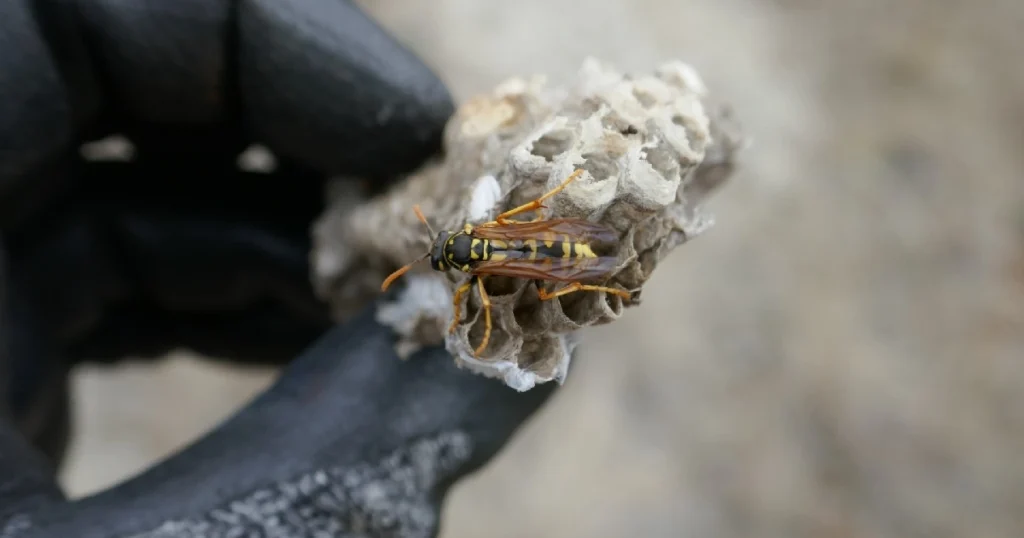
There are two main options to get rid of wasps by dealing with their nests: removal and relocation.
Each method offers various strategies and solutions, including:
Taking preventive measures such as sealing entry points, getting rid of food sources, and monitoring and removing nests.
The best choice for wasp nest management will depend on the specific situation, emphasizing the importance of safety and recommending precautions to avoid stings.
Removing a wasp nest is often the most straightforward solution, but it can be the most dangerous as well. If you choose to remove a nest, it's important to take the proper precautions to avoid getting stung. This includes wearing protective clothing, working at night when the wasps are less active, and using the appropriate tools.
For those looking to remove a mason wasp nest, it's important to note that these wasps are beneficial pollinators and should only be removed if they pose a significant threat. Wood wasp nests, on the other hand, can cause damage to wooden structures and should be removed as soon as possible.
Relocating a wasp nest can be a more humane solution, but it requires more time and effort. This method involves moving the entire nest to a new location where it won't pose a threat to humans or pets. It's important to remember that not all wasp species can be relocated, and it's best to consult with a professional before attempting this method.
If you choose to relocate a mason wasp nest, it's important to do so during the early spring before the queen has established a permanent colony. Wood wasp nests can also be relocated, but it's important to do so before the larvae have hatched.
No matter which method you choose, you should always take the necessary precautions and, if necessary, seek the help of a professional.
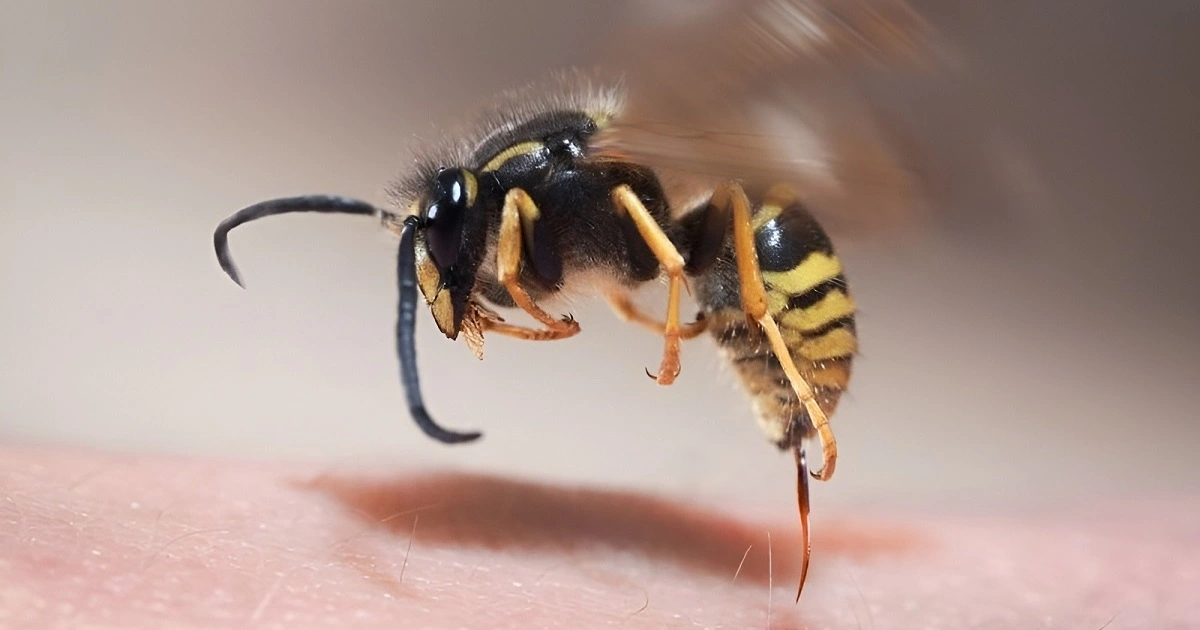
When you encounter wasps, you must protect yourself from their stings. The only way to avoid getting stung is to wear protective clothing. Thick clothing made of cotton or leather can help prevent wasp stingers from penetrating the skin.
You can also wear long-sleeved shirts, pants, and closed-toe shoes to cover yourself as much as possible. Additionally, wearing gloves, a hat and a face mask can provide extra protection from wasp stings.
Even with all precautions, it's possible to get stung by a wasp. This is why it’s necessary to know how to provide first aid for stings. First, we must remove the stinger if it's still in the skin. You can do this by scraping it out with something flat like a credit card.
After removing the sting, wash the affected area with soap and abundant water. Then, apply a cold compress to reduce swelling. You may use over-the-counter painkillers like ibuprofen or acetaminophen to alleviate pain and discomfort. If the sting causes an allergic reaction, seek medical attention immediately.
Taking safety measures when dealing with wasps is crucial to avoid getting stung. Wearing protective clothing and knowing how to provide first aid for stings can help prevent serious injury. By following these guidelines, individuals can keep themselves safe while dealing with wasps.
Regular monitoring and maintenance of your property can go a long way in keeping wasps away. Here are some tips to keep in mind:
By following this advice, you can keep wasps away from your property and prevent them from becoming a nuisance.
Several things can keep wasps away from your house. These include removing food sources, sealing up potential entry points, and using wasp repellents.
To keep wasps away, you can take several measures, such as removing garbage and food sources, sealing up cracks and crevices, and using wasp repellents. It's also recommended to keep outdoor areas clean and free of debris.
Preventing wasps from nesting around the home can be done by removing potential nesting sites such as old wood piles, trimming overgrown bushes and trees, and sealing up any holes or gaps in the house's exterior.
Some plants that can repel wasps when planted near living spaces include mint, eucalyptus, and citronella. These plants have a strong scent that wasps find unpleasant.
To get rid of mason wasps, it's recommended to use a wasp spray designed specifically for them. These sprays can be found at most hardware stores. It's important to follow the instructions on the label carefully.
To effectively remove wood wasps, opt for a spray specifically designed for them, available at most hardware stores. Always ensure to follow the label instructions carefully.
To enjoy outdoor activities without attracting wasps, it's recommended to keep food and drinks covered and sealed, avoid wearing bright colors or floral patterns, and use wasp-repellent sprays or candles.
To keep wasps off balconies and porches, it's recommended to use wasp-repellent sprays or candles, keep food and drinks covered and sealed, and avoid wearing bright colors or floral patterns.
Some household substances that can repel wasps include vinegar, peppermint oil, and cinnamon. These substances can be used in a spray or placed on cotton balls and left in areas where wasps are present. However, it's important to note that these substances may not be as effective as commercial wasp repellents.
Visit our Critter Library and learn more about our furry friends